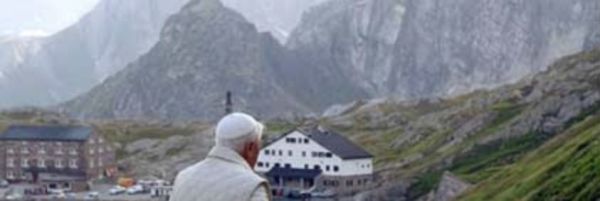Today, all this must give us, as Christians, food for thought. Is our faith sufficiently pure and open so that starting from it "pagans", the people today who are seeking and who have their questions, can intuit the light of the one God, associate themselves in the atriums of faith with our prayers and, with their questions, perhaps also become worshippers? Does the awareness that greed is idolatry enter our heart too and the praxis of our life? Do we not perhaps in various ways let idols enter even the world of our faith? Are we disposed to let ourselves be ceaselessly purified by the Lord, letting him expel from us and the Church all that is contrary to him?
In the temple's purification, however, it was a matter of more than fighting abuses. A new time in history was foretold. What Jesus had announced to the Samaritan woman concerning her question about true worship is now beginning: "The hour is coming, and now is, when true worshippers will worship the Father in spirit and truth, for such the Father seeks to worship him" (Jn 4: 23). The time when animals were sacrificed to God was over. Animal sacrifices were only a substitute, a nostalgic gesture for the true way to worship God. The Letter to the Hebrews on the life and work of Jesus uses a sentence from Psalm 40[39]: "Sacrifices and offerings you have not desired, but a body have you prepared for me" (Heb 10: 5). Christ's body, Christ himself, enters to take the place of bloody sacrifices and food offerings. Only "love to the end", only love for human beings given totally to God is true worship, true sacrifice. Worshipping in spirit and truth means adoring in communion with the One who is Truth; adoring in communion with his Body, in which the Holy Spirit reunites us.
The Evangelists tell us that in Jesus' trial false witnesses were produced who asserted that Jesus had said: "I am able to destroy the temple of God, and to rebuild it in three days" (Mt 26: 61). In front of Christ hanging on the Cross some people, taunting him, referred to these same words: "You who would destroy the temple and build it in three days, save yourself!" (Mt 27: 40). The correct version of these words as Jesus spoke them has been passed on to us by John in his account of the purification of the temple. In response to the request for a sign by which Jesus could justify himself for such an action, the Lord replied: "Destroy this temple, and in three days I will raise it up" (Jn 2: 18ff.). John adds that, thinking back to this event of the Resurrection, the disciples realized that Jesus had been referring to the Temple of his Body (cf. 2: 21ff.). It is not Jesus who destroys the temple; it is left to destruction by the attitude of those who transformed it from being a place for the encounter of all peoples with God into a "den of robbers", a haven for their dealings. But as always, beginning with Adam's fall, human failure becomes the opportunity for us to be even more committed to love of God. The time of the temple built of stone, the time of animal sacrifices, is now passed: the fact that the Lord now expels the merchants does not only prevent an abuse but points to God's new way of acting. The new Temple is formed: Jesus Christ himself, in whom God's love descends upon human beings. He, by his life, is the new and living Temple. He who passed through the Cross and was raised is the living space of spirit and life in which the correct form of worship is made. Thus, the purification of the temple, as the culmination of Jesus' solemn entry into Jerusalem, is at the same time the sign of the impending ruin of the edifice and the promise of the new Temple; a promise of the kingdom of reconciliation and love which, in communion with Christ, is established beyond any boundary.
[Pope Benedict, Palm Sunday homily 16 March 2008]












